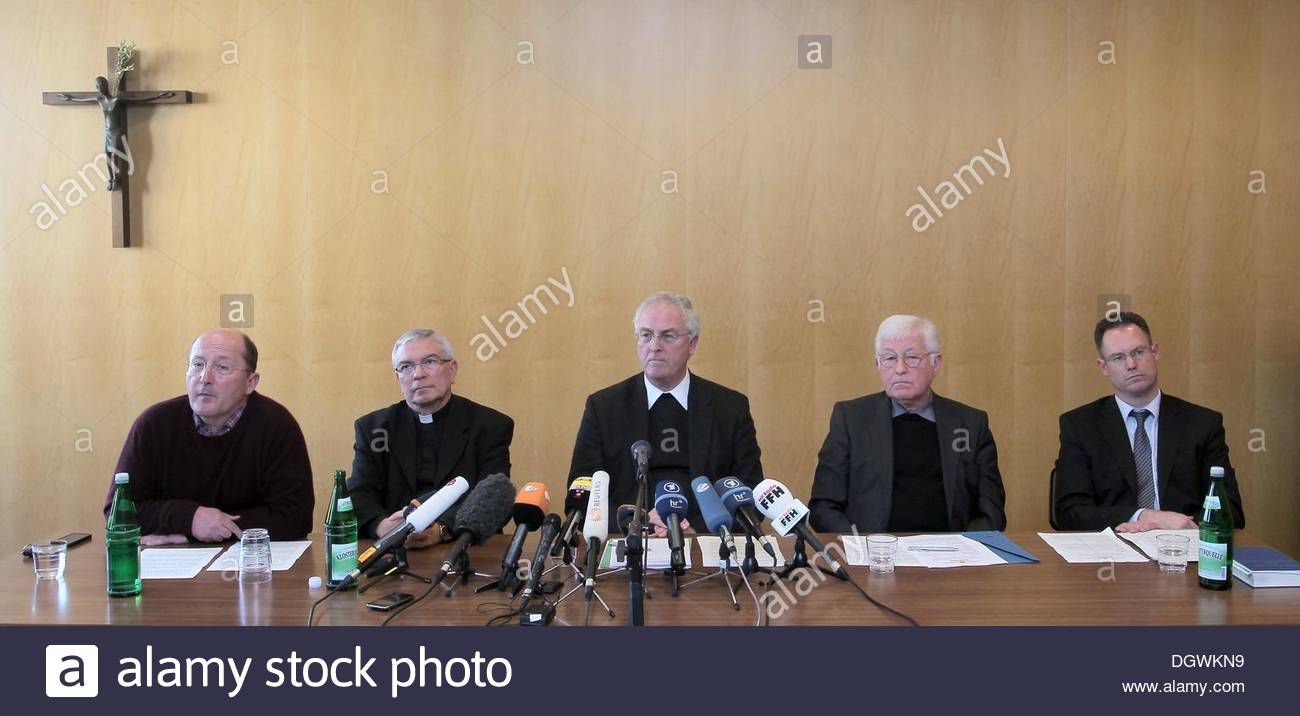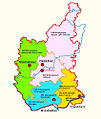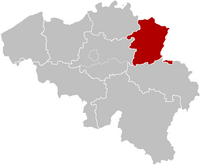Roman Catholic Diocese of Limburg
The Diocese of Limburg (Latin Dioecesis Limburgensis ) is a Roman Catholic diocese in the ecclesiastical province of Cologne, Germany. It includes parts of the states of Hesse and Rhineland- Palatinate. Cathedral church of the diocese is the Cathedral of St. George in Limburg an der Lahn, largest church in the diocese is the Romer in Frankfurt am Main.
The Diocese of Limburg is divided into eleven districts: Frankfurt am Main, High Taunus, Lahn -Dill -Eder, Limburg, Main-Taunus, Rheingau, Rhine -Lahn, Untertaunus, Westerwald, Wetzlar and Wiesbaden. Each district is headed by a priest ( " District Dean " ) and within the districts, there are many different pastoral areas.
Most evangelical Christians in this room belong to the Evangelical Church in Hesse and Nassau.
- 4.1 monasteries and religious communities
- 5.1 Schools sponsored by the Diocese of Limburg
- 5.2 Catholic Adult Education
History
The Diocese of Limburg was founded in 1827 as a result of the reorganization of the Catholic dioceses after the secularization suffragan of the ecclesiastical province of the Upper Rhine with Metropolitan based in Freiburg im Breisgau new. Previously, the area was one of the archdioceses of Mainz and Trier, the northwestern part was kurtrierisch and was thus also governs secular from Trier Archbishopric. It thus belongs to the younger Catholic dioceses. It includes today the territories of the former Duchy of Nassau, the city of Frankfurt am Main, Hesse- Homburg and the former district Biedenkopf. 1929 was assigned as part of Prussia Concordat of the ecclesiastical province of Cologne.
The first bishop was Limburger 1827-1833 Jakob fire. The diocese currently live about 650,000 Catholics, or about 27 percent of the population of the area. It is divided into eleven districts. On 2 February 2007, the resignation of the former Bishop Franz Kamphaus by Pope Benedict XVI was. accepted. His successor chose the Limburg cathedral chapter the auxiliary bishop in the diocese of Münster Franz -Peter Tebartz van Elst, who on 28 November 2007 by Pope Benedict XVI. was appointed and introduced on January 20, 2008 in his office by the metropolitan of the ecclesiastical province of Cologne Archbishop Joachim Cardinal Meisner.
On March 26, 2014 was granted by Pope Francis the Resignation of Bishop Franz -Peter van Elst Tebartz of 20 October 2013, was appointed as Apostolic Administrator Manfred Grothe, Auxiliary Bishop of Paderborn.
The cathedral chapter
The cathedral chapter consists of priests who have care for the service in the cathedral. "As Consultors (consultant) to assist the diocesan bishop in the management of the diocese. The Chapter is a public entity and a public corporation ." In an episcopal election the chapter selects the diocesan bishop of a submitted by Pope list of three candidates. The cathedral chapter include (as of: October 23, 2013):
- Domdekan prelate Geis Günther ( Episcopal Vicar for the synodal bodies )
- Canon Auxiliary Bishop Thomas Lohr
- Canon prelate Helmut Wanka
- Canon Gereon Rehberg
- Canon city deacon John Eltz (as nichtresidierender Kapitular )
Laity in the diocese of Limburg: the " synodal journey "
The " Synod way " was initiated by Bishop Wilhelm Kempf on 16 March 1969, the first election to the Parish Council. The aim is to advise decisions in important matters by laymen and to have a say: " The basic idea is that every public official employed a panel of elected representatives inner faces, which then jointly discuss and decide. " After that is the "office" at the community level - so the priest - which parish council, a body of elected lay over. At the level of the "Pastoral Area ' stand against the priestly head of the Pastoral Committee. Work on the various "levels" of the diocese lay and full-time together: In the parish council in the parish, the Pastoral Committee at the level of the pastoral space in Bezirkssynodalrat at district level. On the diocesan level, there is the episcopal advisory body to the Diözesansynodalrats ( the bishop decides according to the canon law alone. ) And as a mandate representation, the Diocesan Assembly.
Diocesan Assembly
The Diocesan Assembly ( DV) is the elected representation of the Catholics of the diocese of Limburg. Of the 77 members, 58 members of the eleven district meetings are posted in the diocese. There are also 13 people from a free Zuwahlliste and six people from a Zuwahlliste Catholic associations in the diocese.
Your object, the Diocesan Assembly is "to monitor developments in ecclesiastical, social and political life, to discuss and to comment on it ." The Diocesan Assembly is the recognized by the Bishop institution for the purposes of the decree of the Second Vatican Council on the Apostolate of the Laity, No. 26 The Diocesan Assembly published the results of their deliberations mostly in the form of a declaration, and can decide independently on its contents. Topics include bioethical issues, the ministry of the future, the process of dialogue with the German bishops and especially socio-political issues, to which the DV wants to express as the "voice of the laity ."
As the president is in her first term of office Ingeborg Schillai (Taunus stone ) before the Diocesan Assembly, which is represented by Christina circle and Wiegand Otterbach. Together with six other members to form the Executive Committee. The Diocesan Assembly shall normally meet twice in a year, the Bureau about ten times. Therefore, it can take a position on issues, the Bureau also by current observations, such as preimplantation genetic diagnosis (PGD).
The Diocesan Assembly sends members to the regional working groups of Hesse and Rhineland -Palatinate, in the Diözesansynodalrat (DSR ) and the Central Committee of German Catholics ( ZdK ). Currently, as Limburger diocesan councils Barbara Wieland (Frankfurt ), Christian Pulfrich ( Dillenburg ) and Wiegand Otterbach ( Hatton of Oberhausen) in ZdK.
The Committee also maintains close contact with the political parties. The Episcopal Vicar for the synodal bodies, Domdekan prelate Geis Günther, attends meetings of the Bureau and to the two assemblies.
Diözesansynodalrat
The Diözesansynodalrat (DSR ) is the body that advises the Bishop of Limburg prior to any important decisions. The Diözesansynodalrat include the Bishop of Limburg as chairman, president of the Diocesan Assembly, and 18 elected by the Diocesan Assembly members, the Episcopal Vicar for the synodal area, the auxiliary bishop and vicar-general, elected representatives of the Priest Council of Religious Council, the Deacon Board, the Council of European Municipalities of Catholics to other native language, the occupational groups in the pastoral and the community speaker / inn / s and up to four members appointed by the bishop. Overall, the Council currently has 35 members.
" The Bishop and the other members of Diözesansynodalrates inform each other as partners in dialogue and jointly discuss the issues in question. " (§ 77 syno ) The DSR discusses the guidelines and priorities for the ministry in the diocese, the coordination of pastoral activities in the diocese, principles for the use of staff / inside in the pastoral ministry, pastoral principles for the preparation of the budget of the diocese and various other issues. He chooses the majority of the members of the Diocesan Church Council, which administers the church tax revenues of the diocese.
Church institutions
- Church buildings in the diocese of Limburg
- Seminary Limburg
- Educational and cultural Haus am Dom, Frankfurt am Main
- Youth Meeting Hildegardishof, Waldersbach
- Youth Meeting Karl Heim, Kirchähr
- Wilhelm Kempf House ( meeting house ), Wiesbaden- Naurod
- Profile Church Center for Christian meditation and spirituality in the Holy Cross Church in Frankfurt -Bornheim
- Profile Church Center for Grief Counseling in the Church of St. Michael in Frankfurt- Northrend
- Publisher of the Episcopal Ordinariate Limburg
- Episcopal Winery Rudesheim
Monasteries and religious communities
- Poor Handmaids of Jesus Christ - General Motherhouse, Dernbach (Westerwald )
- Arnstein Fathers - Provincial, Arnstein Abbey, Obernhof
- Brothers of Mercy of Montabaur - Mother House, Montabaur
- Brothers of Mercy of Montabaur - General House Niederelbert
- Benedictines - Abbey of St. Hildegard, Rudesheim - Eibingen
- Franciscan monastery pilgrimage Bornhofen, Kamp- Bornhofen
- Franciscan Pilgrimage Kloster Marienthal, Geisenheim - Marienthal
- Holy Spirit Sisters - International Centre, King Stone Mammolshain
- Jesuit College of St. Georgen, Frankfurt am Main
- St. Ignatius Jesuit community, Frankfurt am Main
- Convent of the Capuchin Church of Our Lady, Frankfurt am Main -Innenstadt
- Pallottiner - Mission House, Limburg
- Apostolate Missionary Sisters of the Catholic Apostolate = Monastery Marie Born, Limburg
- Ursuline monastery "St. Joseph " Geisenheim
- Ursuline monastery "St. Angela ", Königstein
- Schönau Abbey, Strüth
- Monastery Tiefthal, Eltville - Martinsthal
- Oblate monastery Allerheiligenberg, Lahnstein
- Cistercian Abbey Marienstatt Streithausen at Hachenburg
- Cistercian monastery Nothgottes, Rudesheim
Closures of churches
In the diocese " Save and Renew " in the parishes are in the process carried out at reduced some parish churches, as the number of churchgoers is often considerably lower than the existing seats in the churches. Usually this means a so-called house -in- house solution that is in the existing church are communal rooms built so that the previously exclusively used liturgically space and otherwise stands for pastoral activities. However, existing churches to be demolished without art-historical importance in the period 2007 to 2015. In several communities affected is significant resistance against these plans is imposed. Next to the church is no longer needed, the diocese states that some of these churches have become dilapidated and considerable expenditure for a renovation would be necessary, as well as the significant heating of the great church rooms. The associated brushing of grants for the farmer as well as maintenance for the heating of the churches met in some parishes also to considerable resentment.
2012, the Sacred Heart church was demolished in Friedrichsdorf.
Schools sponsored by the Diocese of Limburg
Under the umbrella of St. Hildegard School Society of the Diocese of Limburg following Catholic schools than high schools form their entrusted children and young people from:
- Marie School Limburg, Limburg
- St. Ursula School, Geisenheim
- St. Angela School, Königstein im Taunus
- Bishop Neumann School, Königstein im Taunus
- Johannes -Gymnasium, Lahnstein
Catholic Adult Education
The Diocesan Educational Institute of the Diocese of Limburg with headquarters at Haus am Dom in Frankfurt am Main is a member of the Catholic Adult Education - Regional Working Group Hesse.
Publications
The weekly church newspaper, Sunday is the newspaper of the diocese. In addition, the diocese publishes the biannual religious education magazine owls fish.
Holy directory
- Hildegard of Bingen, Parish of St. Hildegard and St. John the Baptist, Eibingen
- Elizabeth of Schönau, Schönau Abbey
- Mary Catherine Kasper, foundress of the Poor Handmaids of Jesus Christ, Dernbach
In addition to the regular budget, what accountability has to be stored, and the diocese of Limburg has to give no account of the bishop's chair, as long as no public funds are used in it. The height of the assets of the Episcopal chair has not been published in the diocese of Limburg until October 2013.
The " Bishop's Chair" was founded in 1827 for the maintenance of each bishop. Today he has the legal form of a corporation under public law. Accountable owes the chair since 2008 no longer the cathedral chapter, but only the bishop and his vicar general; the chapter was removed from power in this regard.
The budget of the diocese comprises the end of 2013 214 million euros. This comes to 83 percent of church taxes.










